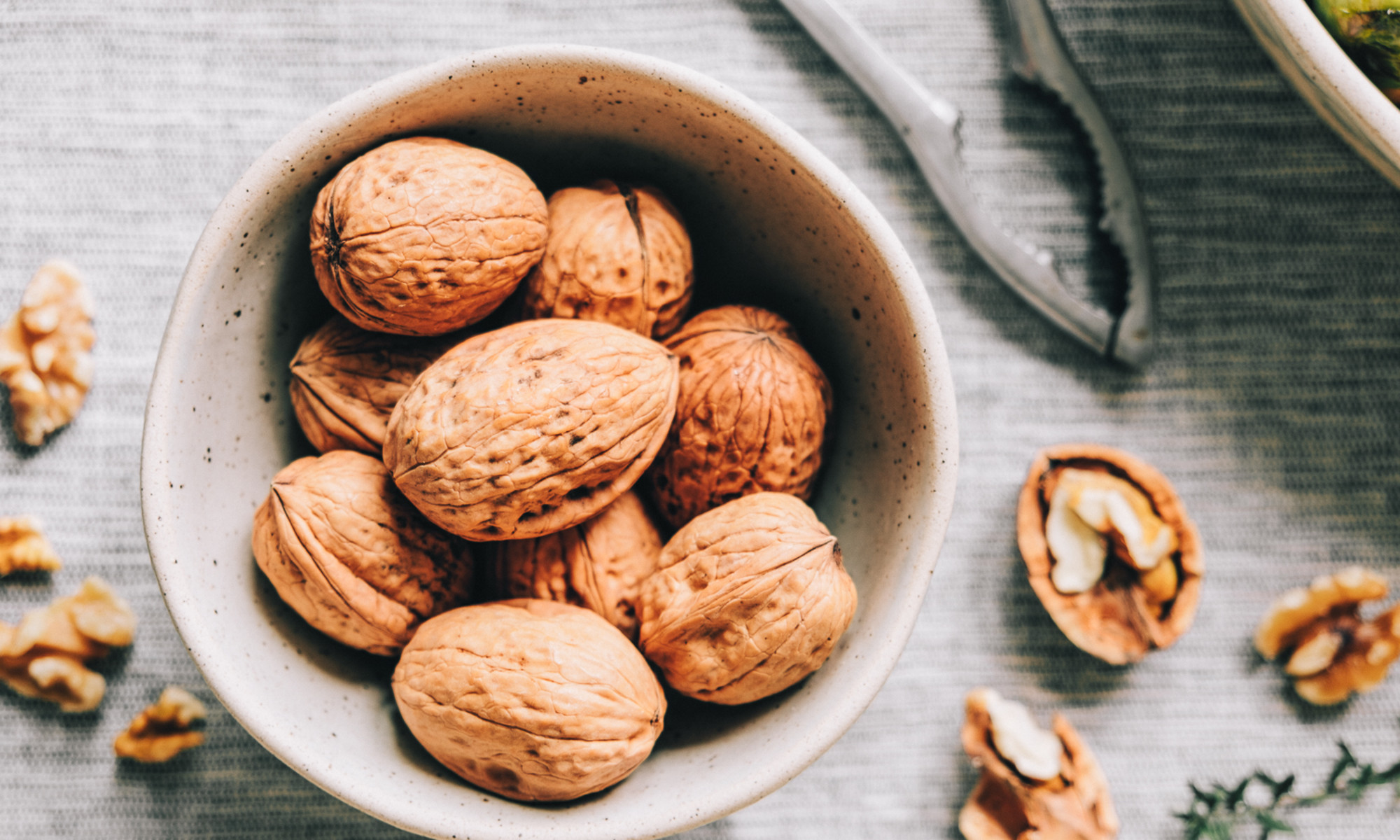Eat This Type Of Nut Daily To Decrease Your Risk Of Cognitive Decline
Walnuts hold health benefits from your head to your toes.


Contributor
Contributor
Hailey Hudson is a freelance writer and content marketer whose work has appeared in outlets like Healthline and Runner's World.

Expert review by
Lauren Torrisi-Gorra, M.S., RD
Registered Dietitian
Lauren Torrisi-Gorra, MS, RD is a registered dietitian, chef, and writer with a love of science and passion for helping people create life-long healthy habits. She has a bachelor’s degree in Communication and Media Studies from Fordham University, a Grand Diplôme in Culinary Arts from the French Culinary Institute, and master's degree in Clinical Nutrition and Dietetics from New York University.
Image by Nataša Mandić / Stocksy May 29, 2023 How often do you eat walnuts? These unassuming brain-shaped nuts aren’t always the most popular—but they hold a myriad of health benefits. A one-ounce serving of walnuts can help boost your brain health, heart health, gut health, and so much more. Learn all about the nutritional benefits of walnuts and the serving size that dietitians recommend here. 
Advertisement
This ad is displayed using third party content and we do not control its accessibility features.
What are walnuts?
Walnuts are small, wrinkled tree nuts (also considered drupes1—fruits with a stone containing a seed) that taste rich, sweet, and sometimes slightly bitter. They’re commonly grown in California and South America.
Walnuts are appropriate for both sweet and savory dishes. However, walnuts can be dangerous for those with tree nut allergies2.
Nutritional information
According to USDA FoodData Central, walnuts3 contain the following nutritional information per 1 ounce, or 14 halves:
Advertisement
This ad is displayed using third party content and we do not control its accessibility features.
“Compared to other tree nuts, walnuts are much higher in the plant source of omega-3 fatty acids,” says May Zhu, MBA, RD, LDN. These fatty acids can’t be made in our bodies—we get them from food—but are essential for brain health and cognition, as well as cardiovascular health.
And don't toss the walnut skins aside. Huma Chaudhry, RD, LDN, adds that the skin of walnuts also contains high amounts of antioxidants that can "help fight inflammation and oxidative damage in the body.”
Walnuts are also an excellent source of copper, folic acid, and vitamins B6 and E4.
Benefits
Walnuts hold benefits from your head to your toes, helping support good health in your brain, heart, gut, and more. Here are their top science-backed perks of eating 'em:
Advertisement
This ad is displayed using third party content and we do not control its accessibility features.
1.
They may benefit brain health.
“Walnuts contain nutrients such as healthy fats, antioxidants, and vitamin E, which all contribute to brain health by reducing oxidative stress and inflammation,” Zhu explains.
Studies suggest that the nutrients in almonds, hazelnuts, and walnuts could help prevent or even manage Alzheimer’s disease5.
“The plant compounds found in walnuts also have been shown to reduce inflammation and oxidative stress in the brain, reducing risk for brain disorders,” Chaudhry says. English walnuts (the most popular type) hold multiple phytochemicals6, including high amounts of polyunsaturated fatty acids, which benefit brain health. The polyphenolic compounds in walnuts reduce inflammation of brain cells and improve neurogenesis7, the formation of new neurons in the brain.
One study also discovered that regular consumption of nuts, in general, could be linked to a decreased risk for cognitive decline8.
Summary
Walnuts contain healthy fats, antioxidants, and vitamin E that can help reduce brain inflammation and support healthy cognition as we age.
Advertisement
This ad is displayed using third party content and we do not control its accessibility features.
2.
They may benefit heart health.
“Consumption of walnuts has been linked most notably to supporting heart health,” Zhu says. This is because walnuts contain significant amounts of alpha-linolenic acid9 (ALA), which reduces the risk of cardiovascular disease. Eating walnuts instead of foods that have saturated fat could help lower the “bad cholesterol” (LDL) and raise your “good cholesterol” (HDL).
Another study has even linked10 walnut intake with reduced stroke rates. A group of participants that ate a Mediterranean diet including plenty of mixed nuts had a 49% reduction in risk of stroke compared with a lower-fat diet control group.
Summary
The ALA fatty acids in walnuts are known to help increase good cholesterol and lower bad cholesterol, supporting heart health.
Advertisement
This ad is displayed using third party content and we do not control its accessibility features.
3.
They can help to balance blood sugar.
Another of the best benefits of walnuts: Their combination of healthy fats, protein, and fiber can reduce blood sugar spikes and maintain balanced glucose levels between mealtimes.
One study on this topic looked specifically at walnut oil, indicating that consuming walnut oil could improve blood glucose levels11 in people with type 2 diabetes. Another study12 (conducted on hyperlipidemic patients with type 2 diabetes) indicated that long-term walnut consumption could reduce fasting plasma glucose and insulin levels.
“The macronutrient combination in walnuts can increase satiety, keeping you full for longer and making it a diabetes-friendly snack,” Chaudhry says.
Summary
Walnuts contain protein, fats, and dietary fiber that can help keep you full between meals and keep your blood sugar steady.
4.
They may help improve sleep quality.
Summary
The magnesium, melatonin, and tryptophan in walnuts make them a healthy and sleep-promoting bedtime snack.
5.
They may help to promote longevity.
Recent research has shown that walnuts may help improve longevity, as well as helping you age more healthily and gracefully.
“Researchers from the Harvard T.H. Chan School of Public Health associated higher walnut intake to lower risk of death among older adults in the U.S.,” Chaudhry says. “The study linked five [or more] servings of walnuts per week to reduced mortality risk18."
She notes that the group that ate more walnuts had a 14% lower risk of death from any cause and 25% less risk of death from cardiovascular disease, plus a gain in about 1.3 years of life expectancy (but it's important to note that this study was funded by the California Walnut Commission).
And as we’ve already seen, walnuts support heart health and reduce the risk of cardiovascular disease19, which is one of the top causes of death20 in the U.S.
Summary
Eating more walnuts may even help you live longer, but we need more research to know for sure.
6.
They may benefit gut health.
Summary
The soluble fiber in walnuts can support gut health and a diverse gut microbiome.
7.
They may improve metabolic health
Summary
Swapping unhealthier snacks with walnuts may reduce your risk of metabolic syndromes like obesity.
Recommended serving
Zhu and Chaudhry both recommend eating an ounce of walnuts (about a handful) per serving, pointing to studies showing that a one-ounce serving is enough28 to improve the quality of your diet and your intake of certain nutrients, like magnesium.
They also recommend eating walnuts as a snack on their own (pre-packaged walnuts are portioned correctly to enjoy on the go); mixed into granola; or as a crunchy topping on salads, yogurt, or oatmeal.
“Top your breakfast oatmeal or pancakes with walnuts or stuff into baked goods like banana bread or scones,” Chaudhry suggests. “I like to roast and chop up walnuts to toss into stir fry, wraps, or use as a crunchy coating for fish and chicken.”
You can also try one of these mindbodygreen recipes that incorporate walnuts:
Allergies and side effects
Of course, if you’re allergic to walnuts, you should leave this food off the menu. Nut allergies can cause anaphylaxis, which can be fatal. Even if you think you’re only allergic to other nuts, check with your doctor before consuming walnuts. Chaudhry says tree nuts can be closely related and may cause cross-reactions.
“Younger children should be supervised while consuming walnut pieces to avoid choking,” adds Zhu. She also explains that eating too many walnuts might cause GI upset like bloating or diarrhea.
Buying and storage tips
Walnuts have a hard outer shell that can help protect them from most harmful pesticides, so you don't necessarily need to buy them organic if you're looking to save some cash.
Eating raw walnuts (versus nuts that are roasted) gives you more antioxidants. “California-grown, organic English walnuts are a high-quality option,” Chaudhry says.
Shelled walnuts should be firm to the touch, not soft or shriveled. Unshelled walnuts should feel full and heavy. Store walnuts in the fridge to keep them fresh, or put them in the freezer for up to one year.
Frequently Asked Questions
How many walnuts should you eat a day?
Experts say the best serving size of walnuts is one ounce, or approximately a handful.
What do walnuts do for your body?
Studies show that the potential benefits of walnuts for your body include better brain health; steadier blood sugar levels; improved quality of life; lower cholesterol; better sleep; improved heart health; and lower disease risk.
What are the benefits of walnuts for females?
The potential benefits of walnuts for females are similar to the benefits of walnuts for males—healthy aging, less insomnia, and decreased risk of cardiovascular disease. There don't appear to be any additional benefits for women's health or hormones specifically.
The takeaway
Walnuts are a powerhouse food to incorporate into your meals and snacks. Ready to reap the benefits of this healthy (and delicious) nut? Learn how they stack up to other popular options, like pecans, here.

 BigThink
BigThink 
































